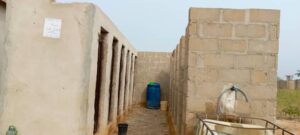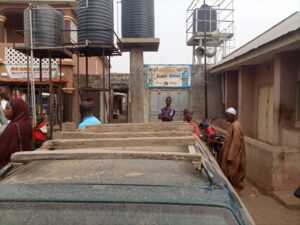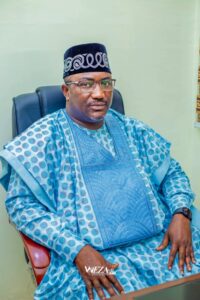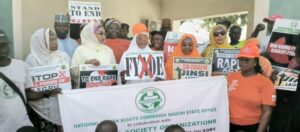
By Khalid Idris Doya, Bauchi
It is an open secret that Katagum Local Government Area in Bauchi state become the eighth area council in the state that recently attained the status of open defecation free (ODF) to join its seven other counterparts, namely Dass, Ganjuwa, Warji, Toro, Gamawa, Bogoro, and Shira, out of the twenty (20) LGAs of the state.
Here one can vividly recalled that Dass LGA in the state was the first to attain the ODF status, ostentively at the tail-end of the Jonathan administration, when it’s minister of health, then, was in Dass to join celebrants of that unprecedented feat, and was even adjudged to be the first LGA in the country to attain ODF status.
In addition, 5,934 other communities in Bauchi state were delivered ODF, while two other LGAs of Bauchi and Zaki were at different levels of becoming ODF, according to the state commissioner for water resources, Abdulrazaq Nuhu Zaki, in Azare headquarters of Katagum Local Government Area for a 2-day media dialogue on World Toilet Day, 2023.
Zaki noted that access to safe functional toilet has a positive impact on public health, human dignity and personal safety, especially for females sanitation system that do not have safety manage excreta allow the spread of diseases like soil transmitted diseases and water related diseases such as cholera, diarrhea, typhoid fever dysentery, and neglected tropical diseases, among others.
The commissioner who was represented by General Manager Bauchi RUWASSA, Alhaji Sabo Adamu said, “As one of the sustainability process, the Bauchi state government identified and trained private entrepreneurs on sanitation marketing for improved latrine construction at households and public places like market places and motor parks, where 194 toilets business owners, (TBOs), 582 Mason’s and 116 toilets”.
According to the commissioner, as a result of the institutional formation and capacity building to the TBOs, Mason’s and toilet investors, a number of 113, 092 improved toilets were constructed across Bauchi state in the efforts to accelerate access to safely manage sanitation facilities.
He added, “These TBOs were hand holders and linked to micro- finance institutions where they can access funds for improved latrine construction on revolving basis and for business expansion by the TBOs. The issuance of revolving loans to households by micro-finance institutions is to fast-track improved latrine uptake”.

Zaki further explained that the construction and usage of improved latrine is s dignity pride, disease prevention, economy prevention of water pollution, as he urged the public to use improved latrine for fecal management to ensure ODF to all the twenty (20) Local Government Areas of the state.
The dialogue organized by the United Nations Childrens’ Fund (UNICEF), is an opportunity for the media to familiarize the media with the ODF achievement, the process to achieve it and through their reports, join the advocacy for an open defecation free Bauchi state, and by extension, an open defecation free in Nigeria.
The dialogue followed a field trip to identified communities to enable them to interact with families and stakeholders who were involved in the process to attain the status in KatagumLocal Government Area, during which our correspondent visited the Ummul-Qura Science Academy, a private educational institution in Azare.
Welcoming the journalists to the academy, the proprietor, Jibril Shiramah told the team, “We are trying our best in the school to make sure that sanitation is going on properly and the students we are trying to bring up on this school is to make them good citizens that will behave well when they grow up to produce good leadership for the country”.

“We also used to instruct the students to replicate the same in their respective homes, like washing the toilets to avoid being infected with communicable diseases. We therefore need intervention in performing these duties, such as provision of omo, Izal and other environmental cleaning materials from the government and general public”.
“The sanitation club was established in this school about two years ago and we have almost 2,000 students with 45 classrooms in the school with 45 toilets, so each class has its own toilet. The pupils are trying to take care of the toilets as there is competition on who to clean them.”
Also speaking, the president of environmental and sanitation club of the school (boys section), Khalil Isa Nakanjuwa, said that they make daily sanitation in the school, washing the toilet twice a day, morning and evening, and sweeping all the school premises, and other necessary activities to keep body and soul healthy.
A student labour master of the academy, Shamsuddeen Sani said that knowing fully the impact of communicable diseases and other tropical diseases, stressing that whenever there are dirty places or water stagnation, they ensure that these places were not accumulated with dirts.
Hadiza Tijjani Ilyas is another student of the Ummul-Qura Science Academy, and president of the environmental sanitation club (girls section), said that they inform and educate students on the effects of bad hygiene to guard against communicable diseases.
Moreover, stakeholders in the Water Sanitation and Hygiene (WASH) sector of Katagumlocal government area have called for construction of more public toilets in motor parks and markets under the Public Private Partnership arrangement, in order to achieve the status of Open Defecation Free (ODF).
The Stakeholders stated this during an assessment visit to a public toilet at the Central Market area in Azare town of Katagum local government Alhaji Auwal Aliyu who runs a toilet business in the area, said that access to the toilets particularly in public places such as motor parks and market areas was very vital as people from within and outside the local government throng the area for business and other activities.
He said that the toilet he is currently operating was constructed in the year 2019 under a Public Private Partnership arrangement, adding that the toilet was designed to meet the needs of all users to include men, women and children.
“The toilet facility has separate compartments for men, women as well as for bathing areas.There is also provision of Solar powered boreholes for water supply in the toilet courtesy of an intervention of the State Rural Water Supply and Sanitation Agency (RUWASSA). We operate this facility till 10 pm in the night and even if someone that wants to use the facility does have money, we allow him to use it for free. This is part of our gesture to discourage defecating in the open,” he said.
Officer-In-Charge/Chief of Field Office, UNICEF Nigeria, Bauchi Field Office, Dr. Clement Adams who earlier declared the media dialogue opened, has congratulated the Katagum LGA for attaining ODF, describing it as a testament of working together to achieve great strides.
He also welcomed the journalists to the dialogue in commemoration of the World Toilet Day, 2023, and celebrated with Katagum people over the ODF feat, and called for increased action to promote healthy, clean, and safe communities by enhancing access to sanitation facilities.
Dr. Clement Adamu explained that World Toilet Day is celebrated every year to bring attention to the undeniable importance of safe and hygienic toilets in people’s daily lives, especially in terms of health, education and socio-economic development.
Adams said, “The access to safe and clean toilets means children, especially girls, and women are protected from the risks of attacks and abuse if they had to go into bushes to defecate. We must therefore reinvigorate our efforts if we must meet the sanitation target of SDG 6 – safe toilets and water for all by the year 2030.
“In Nigeria, about 48 million people still defecate in the open, mostly in the rural areas. This bears severe economic losses for the country. The attainment ofKatagum Local Government Area in Bauchi state needs to be replicated across the country. Out of 774 LGAs in the country, only 105 have been validated Open Defecation Free (ODF).”
Speaking on how the Katagum local government area was recently certified open defecation free, the basic water, sanitation and hygiene (WASH) coordinator of the LGA, Malam Saidu Muhammad Alkali, said that they have been raised community mobilization and awareness engaging community leaders stakeholders and residents was crucial to foston ownership and commitment towards the ODF initiate.

He said behaviour change campaigns were conducted to educate the community about the hazards of open defecation and the benefits of proper sanitation practices, as well as community sanitation were established to oversee the implementation of sanitation initiatives at the village level.
“Household latrine construction encourages households to construct latrines in their homes and hand washing facilities. Community sanitation facilities, public toilets and hand washing facilities were constructed in strategic locations and we also use Civil Defence and ‘Yan Banga,” he said.
Speaking during the assessment visit, the Officer-in-Charge, UNICEF Bauchi Field Office, Dr Clement Adams, said that Public Private Partnership arrangement of toilet construction was effective way of ensuring that more people have access to public toilets, adding the more people have access to toilets, the less people defecate in the open.
“As partners, we are aware of this facility and it is one of the strategies being adopted by UNICEF and the Federal government to build cost-effective, user-friendly public toilets. You cannot use only one strategy, you have to diversify, so we encourage more construction of toilet facilities such as this one across the state,” he said.
Also speaking, the acting General Manager of the State Rural Water Supply and Sanitation Agency (RUWASSA), Adamu Sabo said that the agency supported the Public Private Partnership construction of public toilets because it is effective to manage and gives the toilet operator a sense of commitment to keep the facility hygienic.

He said that last year, the water agency in the state conducted trainings for Toilet Business Owners in the twenty local government areas of the state so that they will be well equipped to man toilet facilities that will be constructed in local governments, adding that the state government is working on a new model of design of public toilets that will be user friendly and inclusive to everyone.


